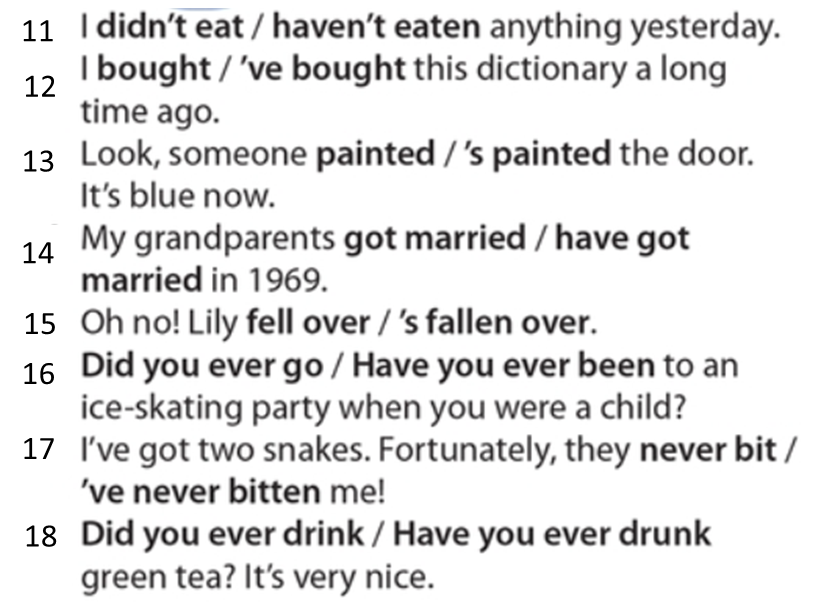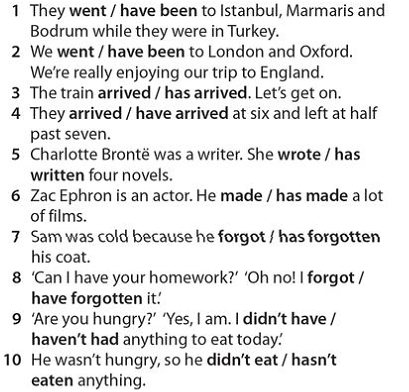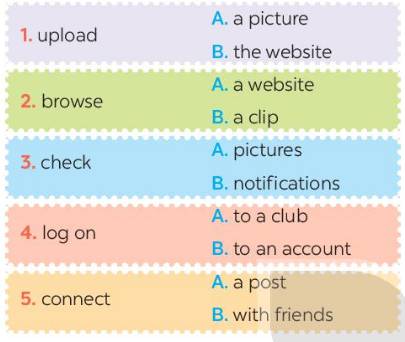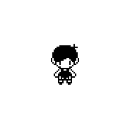Circle the correct options
Tuyển Cộng tác viên Hoc24 nhiệm kì 26 tại đây: https://forms.gle/dK3zGK3LHFrgvTkJ6

Những câu hỏi liên quan
Circle the correct options
1. have been
2. went
3. has arrived
4. arrived
5. has written
6. made
7. forgot
8. have forgotten
9. haven't had
10. didn't eat
Đúng 1
Bình luận (0)
Circle the correct options to complete the phrases.

1. upload a picture: đăng tải một bức ảnh
2. browse a website: duyệt một trang web
3. check notifications: kiểm tra thông báo
4. log on to an account: đăng nhập vào một tài khoản
5. connect with friends: kết nối với bạn bè
Đúng 0
Bình luận (0)
2 Circle the correct options in italics in each of these sentences. 1 Daniel fell / was falling asleep while the teacher spoke / was speaking. 2 We walked / were walking around town when we met / were meeting Jack. 3 Mum washed / was washing the car while the sun shone / was shining. 4 I played / was playing my guitar when Michael came / was coming round. 5 While Mum and Dad watched / were watching television, the phone rang / was ringing. 6 While I rode / was riding my bicycle...
Đọc tiếp
2 Circle the correct options in italics in each of these sentences.
1 Daniel fell / was falling asleep while the teacher spoke / was speaking.
2 We walked / were walking around town when we met / were meeting Jack.
3 Mum washed / was washing the car while the sun shone / was shining.
4 I played / was playing my guitar when Michael came / was coming round.
5 While Mum and Dad watched / were watching television, the phone rang / was ringing.
6 While I rode / was riding my bicycle, I saw / was seeing my old friend Luke.
7 I made / was making a lot of friends while I studied / was studying at college.
8 Did you go / Were you going to many concerts while you lived / were living in London?
9 Robert opened / was opening the packet of spaghetti and was putting / put some in the saucepan.
10 Why were you smile / were you smiling when I was coming / came in the room?
1 Daniel fell / was falling asleep while the teacher spoke / was speaking.
2 We walked / were walking around town when we met / were meeting Jack.
3 Mum washed / was washing the car while the sun shone / was shining.
4 I played / was playing my guitar when Michael came / was coming round
5 While Mum and Dad watched / were watching television, the phone rang / was ringing.
6 While I rode / was riding my bicycle, I saw / was seeing my old friend Luke.
7 I made / was making a lot of friends while I studied / was studying at college.
8 Did you go / Were you going to many concerts while you lived / were living in London?
9 Robert opened / was opening the packet of spaghetti and was putting / put some in the saucepan.
10 Why were you smile / were you smiling when I was coming / came in the room?
* S1 was/ were Ving when S2 Ved
* S1 Ved while S2 was/ were Ving
Đúng 1
Bình luận (0)
4. Listen to a doctor and a headteacher, and circle the TWO correct options for each person.(Lắng nghe bác sĩ và giáo viên hiệu trưởng, và khoanh tròn HAI lựa chọn đúng cho mỗi người.)1 The doctors aims are to(Mục đích của bác sĩ là)a. encourage the patient to set up a healthier working space and habit.(khuyến khích bệnh nhân có một môi trường làm việc và thói quen khoẻ mạnh.)b. warn the patient of the dangers of using digital devices before bedtime.(cảnh báo bệnh nhân về nguy hiểm của việc sử d...
Đọc tiếp
4. Listen to a doctor and a headteacher, and circle the TWO correct options for each person.
(Lắng nghe bác sĩ và giáo viên hiệu trưởng, và khoanh tròn HAI lựa chọn đúng cho mỗi người.)
1 The doctor's aims are to
(Mục đích của bác sĩ là)
a. encourage the patient to set up a healthier working space and habit.
(khuyến khích bệnh nhân có một môi trường làm việc và thói quen khoẻ mạnh.)
b. warn the patient of the dangers of using digital devices before bedtime.
(cảnh báo bệnh nhân về nguy hiểm của việc sử dụng thiết bị điện tử trước khi đi ngủ.)
c. recommend a course of treatment.
(gợi ý liệu trình điều trị.)
2. The headteacher's aims are to
(Mục đích của hiệu trưởng là)
a. persuade students to use the multi-media classroom.
(thuyết phục học sinh sử dụng phòng học đa phương tiện.)
b. inform people about the new multi-media classroom.
(thông báo đến mọi người về phòng học đa phương tiện mới.)
c. thank people for helping the school to raise money.
(cảm ơn mọi người đã giúp đỡ trường học để gây quỹ.)
5. E. Circle the correct options to make second conditional sentences. (Khoanh tròn các phương án đúng để tạo thành câu điều kiện loại 2.)1. If I had my own car, I will not have to / would not have to take a bus to work every day.2. If you had a sister, will you share / would you share your money with her?3. Your parents would be angry if you waste / wasted the money they gave you.4. If I am / were you, I would get a new job with better pay.5. If Jonathan speaks / spoke English well, he could ap...
Đọc tiếp
5. E. Circle the correct options to make second conditional sentences.
(Khoanh tròn các phương án đúng để tạo thành câu điều kiện loại 2.)
1. If I had my own car, I will not have to / would not have to take a bus to work every day.
2. If you had a sister, will you share / would you share your money with her?
3. Your parents would be angry if you waste / wasted the money they gave you.
4. If I am / were you, I would get a new job with better pay.
5. If Jonathan speaks / spoke English well, he could apply for a job with a high salary at a foreign company.
6. If I owe / owed money to someone, would you lend me some?
7. If he won the lottery, he will buy / might buy a nice car.
8. The company can save / could save up to 100,000,000 đồng annually in operating costs if the managers decided to buy modern machines for production.
1. If I had my own car, I will not have to / would not have to take a bus to work every day.
2. If you had a sister, will you share / would you share your money with her?
3. Your parents would be angry if you waste / wasted the money they gave you.
4. If I am / were you, I would get a new job with better pay.
5. If Jonathan speaks / spoke English well, he could apply for a job with a high salary at a foreign company.
6. If I owe / owed money to someone, would you lend me some?
7. If he won the lottery, he will buy / might buy a nice car.
8. The company can save / could save up to 100,000,000 đồng annually in operating costs if the managers decided to buy modern machines for production.
Đúng 2
Bình luận (0)
Complete the text with the correct word from the three options.
Read the passage below and circle the best answer from the four options marked A, B, C or DThe loss of the jobs and persistent unemployment in the industrial countries is due mainly to changes in technology. It is thought to be misleading to blame job losses on the shift of corporations from the industrial countries to the Third World.The present technological developments have been compared to a Third Industrial Revolution. The first coming in the 19th century, was characterized by the steam en...
Đọc tiếp
Read the passage below and circle the best answer from the four options marked A, B, C or D
The loss of the jobs and persistent unemployment in the industrial countries is due mainly to changes in technology. It is thought to be misleading to blame job losses on the shift of corporations from the industrial countries to the Third World.
The present technological developments have been compared to a Third Industrial Revolution. The first coming in the 19th century, was characterized by the steam engine and the use of coal. In the 1920s the second emerged with the use of oil and the electrodynamo. The third, the present one, is driven by computers, biotechnology and information technology.
However, there can be seen weaknesses in the newest of industrial revolutions. The technology is advancing so fast and productivity is rising so fast that we are left with a big problem. Because of the loss in jobs, caused largely by this new, technology, there will not be enough people with money to buy all these products.
Technology as definitely enhanced our standard of living, even our quality of life. But as the capacity to produce expands and the lack of purchasing power and consequent demand diminish, there can be overproduction and recession, and what happens to our standard of living?
1. What is the main point the author is making? *
1 điểm
A. That the industrial countries have more unemployment than the Third World.
B. That technology is the main cause of unemployment.
C. That corporations have shifted to the Third World.
D. That the present situation is like in the Industrial Revolution.
2. Which of the following is not a characteristic of one of the industrial revolutions? *
1 điểm
A. The use of oil
B. The use of computer
C. The use of electricity
D. The use of coal
3. What is stated as being the main weakness of the Third Industrial Revolution? *
1 điểm
A. There will be too few people who can afford to buy things.
B. There won't be enough products for everyone to buy.
C. There will not be enough money around.
D. There will be too many machines in the factories.
4. Why does the author think that there won't be enough people to' buy the products? *
1 điểm
A. People will not be able to keep up with technology.
B. Productivity will not be high enough.
C. There will be too many products.
D. Many people will be unemployed
5. What do we infer is the author's attitude to the technology? *
1 điểm
A. It has improved our purchasing power
B. It has improved our quality of life
C. It has created more jobs
D. It is not responsible for the recession
1. What is the main point the author is making? *
1 điểm
A. That the industrial countries have more unemployment than the Third World.
B. That technology is the main cause of unemployment.
C. That corporations have shifted to the Third World.
D. That the present situation is like in the Industrial Revolution.
2. Which of the following is not a characteristic of one of the industrial revolutions? *
1 điểm
A. The use of oil
B. The use of computer
C. The use of electricity
D. The use of coal
3. What is stated as being the main weakness of the Third Industrial Revolution? *
1 điểm
A. There will be too few people who can afford to buy things.
B. There won't be enough products for everyone to buy.
C. There will not be enough money around.
D. There will be too many machines in the factories.
4. Why does the author think that there won't be enough people to' buy the products? *
1 điểm
A. People will not be able to keep up with technology.
B. Productivity will not be high enough.
C. There will be too many products.
D. Many people will be unemployed
5. What do we infer is the author's attitude to the technology? *
1 điểm
A. It has improved our purchasing power
B. It has improved our quality of life
C. It has created more jobs
D. It is not responsible for the recession
Đúng 2
Bình luận (0)
Circle the best options (A, B, C, or D).Question 5. My brother enjoys going _______ in the river with my grandfather every Sunday morning. A. rock climbing B. fishing C. cycling D. joggingQuestion 6. A camping trip to the countryside is a good way to experience ________. A. environment B. hobby C. recipe D. natureQuestion 7. Carlos doesn’t like ________ online with his friends. He prefers hanging out with them. A. chatting B. picking C. watching D. herdingQuestion 8. Our school is building a new...
Đọc tiếp
Circle the best options (A, B, C, or D).
Question 5. My brother enjoys going _______ in the river with my grandfather every Sunday morning. A. rock climbing B. fishing C. cycling D. jogging
Question 6. A camping trip to the countryside is a good way to experience ________. A. environment B. hobby C. recipe D. nature
Question 7. Carlos doesn’t like ________ online with his friends. He prefers hanging out with them. A. chatting B. picking C. watching D. herding
Question 8. Our school is building a new sports ______ on the west side of its campus. A. entertainment B. facility C. vehicle D. reduce
Question 9. My parents let me stay up late until midnight on Christmas’ ________ to unwrap the presents. A. event B. festival C. Eve D. parade
Question 10. I hate _______ jewelry because it’s boring. I like playing board games with my sister. A. to design B. designing C. design D. to designing
Question 11. I _______ a karate class every evening after school ________ 7 p.m.
A. having/ until B. has/ to C. have/ to D. have/ until
Question 12. My sewing classes are ________ 3 p.m. ________ 5 p.m. _______ Saturday and Sunday.
A. from/ until/ in B. from/ to/ in C. from/ to/ on D. from/ until/ at
Question 13. This store sells _______ candies and cookies, but I don’t have _______ money to buy. A. a lot of/ much B. too many/ much C. enough/ lots of D. lots of/ too many
Question 14. Linh: “I think it’s better to live in the city.” – Nga: “_________” A. Maybe. Where is it?
B. That’s true. There are lots of things there.
C. Let’s go to the city together.
D. Really? Sorry, I can’t do it.
Question 5. My brother enjoys going _______ in the river with my grandfather every Sunday morning. A. rock climbing B. fishing C. cycling D. jogging
Question 6. A camping trip to the countryside is a good way to experience ________. A. environment B. hobby C. recipe D. nature
Question 7. Carlos doesn’t like ________ online with his friends. He prefers hanging out with them. A. chatting B. picking C. watching D. herding
Question 8. Our school is building a new sports ______ on the west side of its campus. A. entertainment B. facility C. vehicle D. reduce
Question 9. My parents let me stay up late until midnight on Christmas’ ________ to unwrap the presents. A. event B. festival C. Eve D. parade
Question 10. I hate _______ jewelry because it’s boring. I like playing board games with my sister. A. to design B. designing C. design D. to designing
Question 11. I _______ a karate class every evening after school ________ 7 p.m.
A. having/ until B. has/ to C. have/ to D. have/ until
Question 12. My sewing classes are ________ 3 p.m. ________ 5 p.m. _______ Saturday and Sunday.
A. from/ until/ in B. from/ to/ in C. from/ to/ on D. from/ until/ at
Question 13. This store sells _______ candies and cookies, but I don’t have _______ money to buy. A. a lot of/ much B. too many/ much C. enough/ lots of D. lots of/ too many
Question 14. Linh: “I think it’s better to live in the city.” – Nga: “_________” A. Maybe. Where is it?
B. That’s true. There are lots of things there.
C. Let’s go to the city together.
D. Really? Sorry, I can’t do it.
Đúng 1
Bình luận (0)
Choose the correct options (A, B, or C) for each of the following questions.
Retailers associated Black Friday with _______.
A. financial loss
B. red ink color
C. profits
Đáp án: B
Thông tin: As they might put it, the term Black Friday came from an old way of recording business accounts: losses were recorded in red ink and profits in black ink.
Dịch: Như họ có thể nói, thuật ngữ Thứ Sáu Đen xuất phát từ một cách ghi chép tài khoản kinh doanh cũ: các khoản lỗ được ghi bằng mực đỏ và lợi nhuận bằng mực đen.
Đúng 0
Bình luận (0)























